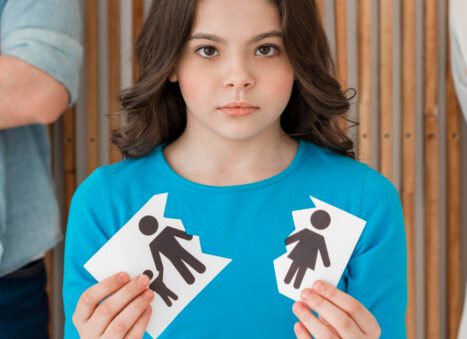
What Is A Gaslighting Parent? Signs To Spot A Gaslighting Parents
Gaslighting parents. It might be the first time you are coming across this term; you might also be familiar with it. Irrespective of who you are, I am sure you have been gaslighted before.
And some of the signs and examples of gaslighting I am going to talk about should make you realize – “wait, that happened to me too.” It is hurtful and painful to talk about. But, because the quick jabs of gaslighting are often sneaky, subtle, and done unconsciously sometimes, it is more hurtful when your parent does it on purpose and does it out in the open.
So, if you are ready to point out the signs of gaslighting and how that affects the parent-child relationship, this article should help you.
What Is A Gaslighting Parent

Gaslighting is a way of psychologically manipulating someone. It could be in the family, in a romantic relationship, or at the workplace. The practice involves someone psychologically manipulating someone else’s feelings, experiences, and own reality and experiences.
The main motive behind such behavior is to get control over another person or gain the upper hand; people often indulge in gaslighting to avoid being accountable for their actions.
The term supposedly arose from the American Psychological thriller film Gaslight. The film is about a husband who is trying to make his wife believe that she is mentally unstable and needs help. He does this to steal from her.
A gaslighting parent usually does this out of fear, paranoia, or any personality disorder or mental illness they are unwilling to acknowledge. They try to make the child believe what they felt or said was strange.
Intentional Vs. Unintentional Gaslighting
Gaslighting is an act of changing someone’s perception of reality. Parents can often gaslight their children intentionally or unintentionally. Such manipulation can affect the mental health of their children in any way. Unintentional gaslighting happens when they aren’t aware of their children’s feelings and experiences and end up manipulating them anyway.
Both forms of gaslighting lead children to feel confused about their feelings and their emotions. Such parents should understand the feelings of their children and create a supportive environment where their children’s emotions and feelings are valued.
8 Signs Of Gaslighting Parents
Unintentional gaslighting hurts the same as the intentional or conscious act of gaslighting. When the action is intentional, it shows the parent’s intention to undermine their child’s trust in themselves. Here are some signs of gaslighting parents –
1. Ignoring Children’s Subjective Experience
Sometimes parents may gaslight by ignoring the event or experience their child had. For example– the child might come out expressing their feeling of isolation or loneliness or being scared of their parent’s behaviors.
But the parent might gaslight by denying the fact that the event ever happened. They might even say – “that is strange, you must be forgetting something, that never happened.” it is not that the parent has forgotten the incident. They are just constantly questioning the reality of their child.
Read Also: Worst age for divorce for children – Here’s What Fathers Must Know
2. Shifting Blames to the Children
Manipulating the reality and their children’s perception of the reality was step one. The next step is to shift the blame onto the child. Even if the reality is quite evident of the actions they took, they’ll refuse to accept it.
That’s just one part of the difficulty they instill in their children. They’ll instill self-blame in their children and make them emotionally confused and distressed.
3. Playing The Victim Card
Playing the victim in a parent-child relationship is a sign of narcissism, covert psychopaths, and gaslighters. Sometimes the parents might refuse to adhere to their part in a problem and avoid it all cost playing the card of a victim. They might act as if they were the ones who were wronged.
As a child, one might be concerned about their parent’s feelings and might overlook the subtle signs of gaslighting. But playing the victim card is, according to many professional therapists, a sign of gaslighting.
4. No Apologies
Aside from misleading their children’s perception of reality, gaslighting parents would act unapologetically. They act like they are above their children and their children don’t deserve any apologies. Such parents completely shut off the possibility of their children getting any apologies from them.
5. Making The Children Feel Worse About Their Condition

Instead of offering any emotional support to the children, sometimes the gaslighting parents make them feel worse about their condition. It can be anything. The children might be under any type of difficult situation like isolation, mistakes, failures, or just stress. But the parents have to make them feel worse about themselves. It is a sign of gaslighting.
6. Controlling Parents
Many therapists claim that the controlling nature of parenting can often be a sign of gaslighting. They might try to evaluate their children based on their level of obedience. Gaslighting parents want to have control of the likes, dislikes, beliefs, and values their children adhere to.
7. Being Too Friendly!

Sometimes, the gaslighting parents might want to be too close to the children. They want to befriend their children, and in this attempt, they become overly protective of their emotional states like – sadness, loneliness, disappointment, etc. It leads to the children’s inability to deal with emotions like those. They also become quite indecisive as a result.
8. They Know the Best
Gaslighting parents claim that they know the best and strongly discard their children’s emotions and opinions. Their children are their tools to execute their own desires, dreams, and successes. Their actions often steal the autonomy or the free will of their own children. Children have the feeling of consistently being undermined by their parents.
Gaslighting Phrases Used By Gaslighting Parents
So, yes, gaslighting is done with words that come out cold. Here is what you might hear from a gaslighting parent.
- You are not making sense.
- That never happened. You are mistaken.
- You are crazy.
- That’s nothing. You are only making a big deal out of it.
- You are being sensitive.
- I did what was best for you.
- I criticize you because I love you.
- You are overreacting.
- You are being emotional.
- Enough of this drama. Stop being too emotional.
- You should have listened to me, or none of this would have ever happened.
- There you go again, making up stories.
- Anybody can do that. You are just making excuses for not doing it.
- Stop overreacting. It is no big deal.
- That’s not what happened. You remember wrong.
- Did I ever manipulate you?
- I did so much for you. What more did you expect?
- All you need is some good sleep. You don’t need therapy.
- You should have put on the shoes I told you to.
- Yes, you did not see it. Because I did not do it.
Effects Of Gaslighting On Children
Gaslighting can lead to the denial of reality. When children are under constant incidents of gaslighting by their parents, they start to deny their reality and their feelings. It might lead them to think that they are crazy. Gaslighting behaviors by the parents might lead the children to feel –
- Confused
- Doubt themselves
- Low self-esteem
- Depression
- Anxiety
The effects might also take a serious turn as their distorted reality collapses. Mental health issues like psychosis might occur due to gaslighting behaviors.
Conclusion
Gaslighting parents can improve their behaviors and help their children deal with the state they are in. However, excessive gaslighting behaviors are close to abuse. It would help to talk to your school counselors or other trusted adults about the gaslighting behaviors and seek a solution.
I hope that this article was helpful. However, if you have any further queries, you can ask them in the comment section. We will be quick to reach out to you.
Read Also:
Already have an account?
Sign In
Create your account
User added successfully. Log in









